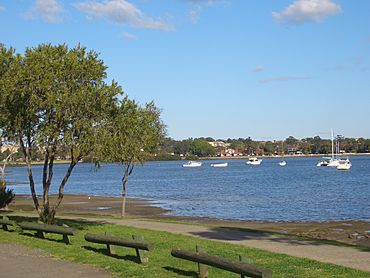Wareemba facts for kids
Quick facts for kids WareembaSydney, New South Wales |
|||||||||||||||
|---|---|---|---|---|---|---|---|---|---|---|---|---|---|---|---|

Hen and Chicken Bay
|
|||||||||||||||
| Population | 1,546 (2016 census) | ||||||||||||||
| • Density | 5,200/km2 (13,000/sq mi) | ||||||||||||||
| Postcode(s) | 2046 | ||||||||||||||
| Area | 0.3 km2 (0.1 sq mi) | ||||||||||||||
| Location | 10 km (6 mi) from Sydney CBD | ||||||||||||||
| LGA(s) | City of Canada Bay | ||||||||||||||
| State electorate(s) | Drummoyne | ||||||||||||||
| Federal Division(s) | Reid | ||||||||||||||
|
|||||||||||||||
Wareemba is a small suburb in Sydney, Australia. It is located in the Inner West part of the city. Wareemba is about 12 kilometers west of Sydney's main city center. It sits right on the eastern shore of Hen and Chicken Bay. This bay is part of the Parramatta River. Wareemba is one of the smallest suburbs in Sydney when it comes to land size.
Contents
A Look Back: Wareemba's History
People from Europe started settling in this area in the 1830s. At first, the land was mostly used for farming. Wareemba used to be part of the nearby suburb of Abbotsford. However, in 1993, it became its own separate suburb. The name Wareemba comes from an Aboriginal word. It means "place where sweet water meets salt water."
Shopping and Cafes in Wareemba
Wareemba has a small area with shops. These shops are located along Great North Road. Wareemba is well-known for its coffee shops. There is even one unique business that is both a fruit shop and a coffee shop!
Places of Worship
Wareemba has a church called Wareemba Gospel Hall. It is located on Coranto Street.
Who Lives in Wareemba?
According to the 2016 Census, 1,546 people lived in Wareemba.
People and Their Backgrounds
Like some nearby suburbs, Wareemba has many residents with Italian heritage. About 22.6% of the people living here have Italian ancestry.
Most people (67.0%) in Wareemba were born in Australia. The next most common countries of birth were Italy (10.6%), England (2.5%), and New Zealand (1.4%). Most people (68.3%) speak only English at home. However, Italian is also a common language spoken at home, with 17.5% of residents speaking it. When it comes to religion, the most common answer was Catholic (51.6%). Many people also reported having no religion (18.4%) or being Anglican (8.2%).
 | Jessica Watkins |
 | Robert Henry Lawrence Jr. |
 | Mae Jemison |
 | Sian Proctor |
 | Guion Bluford |


